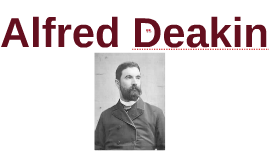Alfred Deakin
Transcript: Born Alfred Dekin was born on 3 August 1856 Collingwood, Melbourne, Victoria, Australia Family Background Alfred deakin was the second of two children of William Deakin dad and Sarah Bill mum, who imigrated from England to Adelaide in 1849. William first worked as a clerk, before moving to Melbourne in 1851 during the Victorian gold rush. Family Alfred Deakin married Pattie Deakin on the 3rd April 1882 in Melbourne, despite opposition from her family who were concerned about Alfred's seemingly delicate health. Children: Ivy born 1883, Stella born 1886, Vera born 1891. Pattie Deakin Pattie Deakin was born in 1863, the fifth of eleven children, to Hugh Junor Browne and his wife Elizabeth. The family was wealthy upper class family. Pattie enjoyed a happy, active childhood with her brothers, sisters and school friends. She was taught by governesses and then at school. She first met Alfred Deakin in 1877 at the Sunday School she attended (the Progressive Lyceum), where he was a teacher. The Progressive Lyceum was a Spiritualist Sunday School. Education Alfred Deakin began his education aged 4 at a boarding school situated first at Kyneton and later at South Yarra. Then at the age of 7 he went to the Melbourne Church of England Grammar School from 1864 to 1871. At sixteen he began studying law at the University of Melbourne also working as a school teacher and private coach. Like most law students at the time, he completed the required law subjects at the University, but did not enrol for a law degree. He was a keen member of the university’s debating club and other societies promoting radical thought, including spiritualism. When sixteen he was also the editor of a spiritualist paper. When he became a barrister in 1878, he had already written a play called Quentin Massys and published a long book, called A New Pilgrim’s Progress. Residence He lived in Melbourne for most of his life but lived in Canberra whilst in politics. Life Before Politics His law career was slow and for several years he earned money writing for a leading Melbourne newspaper, The Age. David Syme, the editor of the Age, supported and influenced Deakin's entry into politics. Early Political Life Deakin first came into governement in 1883. He was made Solicitor-General and Minister for Public Works and Water Supply. In his role as Solicitor-General he advised the government on legal matters and represented the government in court. Deakin became known as one of the best public speakers of his time. In parliament, he started health and safety regulation of factories, and supported irrigation schemes. Though he never became Premier, he was one of the leaders of the Coalition that governed Victoria from 1885 to 1890. He suffered personally and politically losing all his savings in the economic crisis of the early 1890s. He returned to the backbenches, refusing to hold office as a minister. Instead, he revived his work as a barrister and, most of all, supported the federation movement. He led the Victorian campaign for federation. Throughout his career in federal politics he wrote an anonymous column for the London Morning Post. Political Party Deakin's parties were the Protectionist and the Commonwealth Liberal Party. Federation As a strong believer in federation, he represented Victoria at various conferences and became a great friend of Edmund Barton. He used his powers of speach to ensure that Victorians voted 'Yes' to a new federal constitution (agreement to become one nation). Not surprisingly, he was appointed Victorian representative to present the Australian Colonies Government Bill to the British Parliament. His Vision Deakin's idea was to have equal rights for all Australian citizens regardless of wealth or standing. Through his vision, he saw Australia as a nation made up of British people. In Parliament He won the seat of Ballarat, Victoria at the first federal election on 29 March 1901 and held it through the next three elections. Deakin was Deputy Prime Minister to Sir Edmund Barton's ministry in the first federal government in 1901. When people tried to persuade him not to pass the bill for the creation of the High Court in 1902, he made the most famous speech of his career to gain support. The speech is still sometimes talked about in the High Court to explain its role. When Edmund Barton resigned as Prime Minister to become a judge of the new court in 1903, Deakin took his place. He was prime minister at age 47. He was voted Prime Minister on three seperate acations: from 24th of September 1903 to 27th of April 1904, from 5th of July 1905 to 13th of November 1908, and then from 2nd June 1909 to 29th April 1910. He was Prime Minister for a total 4 years, 10 months, 10 days. Deakin used his relationships throughout the British Empire to join the various parts of the British empire together. He took important steps to strengthen Australia's armed forces. For his first two terms, he had to rely heavily on the Independent Labour Party

















